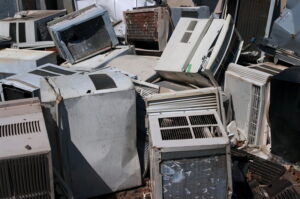Nobody wants to pay to replace an expensive but necessary appliance in their home. But “necessary” means “necessary”! You can’t make it through the summer without an effective air conditioning system to cool off your home. The AC that is currently keeping your house comfortable during hot weather isn’t immortal or invincible, and at some point you’ll need to arrange for a new AC installation in Sandersville, GA.
This post will help you better understand how long you can expect a central AC to last and how to tell when your air conditioner has reached the end of its useful life. Follow us below for more.
Understanding Service Life Estimates for Central ACs
The lifespan of a central air conditioning unit can vary based on several factors, including the quality of the unit, how well it has been maintained, and the local climate conditions. On average, you can expect a central AC to last between 10 to 15 years. Higher-end models with regular professional maintenance might stretch to 20 years, but this is relatively uncommon.
Factors influencing your AC’s lifespan include:
- Maintenance: Regular servicing can significantly extend the life of your AC. This includes changing filters, cleaning coils, and checking refrigerant levels.
- Usage: The more frequently you use your AC, the faster it will wear out. In hotter climates where the AC runs most of the year, you might see a shorter lifespan.
- Installation Quality: Proper installation ensures your AC operates efficiently and reduces the likelihood of premature failure.
Signs Your AC Is Reaching the End of Its Life
Even if your AC hasn’t hit the 10-year mark, it might still show signs of aging. Here are some indicators that it might be time to consider a replacement:
- Frequent Breakdowns: If your AC requires constant repairs and parts replacement, it’s a sign that it’s struggling to keep up.
- Rising Energy Bills: Older AC units tend to lose efficiency, causing your energy bills to spike despite consistent usage.
- Inconsistent Temperatures: If some rooms are too cold while others are too warm, it could indicate your AC is no longer distributing air evenly.
- Strange Noises: Unusual sounds like grinding, banging, or squealing can signal severe mechanical issues.
- Excessive Dust and Humidity: An old AC might not filter air properly, leading to increased dust or failing to manage humidity levels effectively.
- Outdated Refrigerant: Older AC models often use R-22 refrigerant, which is being phased out due to environmental concerns. Replacing such units can save you money in the long run.
When to Call Our HVAC Professionals
If you notice any of these signs, it’s essential to call our HVAC pros for an expert opinion. They can assess the condition of your unit and help you determine whether repair or replacement is the best option.
Choosing to invest in a new air conditioning system offers several benefits:
- Energy Efficiency: New models are more energy-efficient, which can lead to significant savings on your utility bills.
- Improved Comfort: Modern AC units offer better temperature control, humidity management, and quieter operation.
- Reliability: A new AC reduces the risk of unexpected breakdowns and costly repairs.
- Eco-Friendly Options: Many new units use environmentally friendly refrigerants and have higher SEER2 ratings, reducing your carbon footprint.
If your air conditioner is showing signs of aging or inefficiency, don’t hesitate to contact us. We’ll guide you through the process, from selecting the right unit to professional installation, ensuring your home stays cool and comfortable for years to come.


